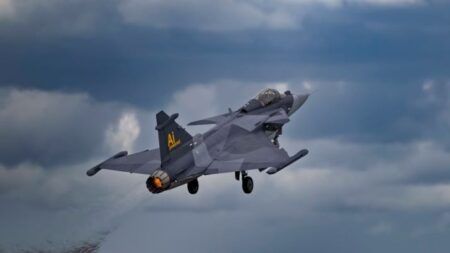The UK’s Civil Aviation Authority has approved operational authority for operator Drone Major to conduct beyond visual line of sight drone flights over the UK’s critical national infrastructure.
The approval enables long-distance drone operations in non-segregated airspace over critical infrastructure for the first time in the country.
The development will initially enable long-range drones to patrol UK rail networks to provide real-time detection and monitoring of trespassers.
The approval represents a step toward enabling more complex beyond visual line of sight operations across other areas of critical national infrastructure, with potential applications in energy, utilities, defense, border management, and infrastructure surveillance.
Network Rail enabled and funded the work, paving the way for trials of the technology on a 7.5-mile (12km) route between Wolverhampton and Sandwell & Dudley Station. According to Drone Major, the trials could improve safety, speed, and efficiency of UK railway service while delivering savings.
The project would demonstrate the potential to deploy drones at scale over critical national infrastructure. Drone Major’s technology has already been tested along the rail corridor southeast of Wolverhampton station and the Severn Valley Railway lines.
According to the company, the system could speed up verification and interception of trespassers, reducing delays to trains in busy areas and potentially saving lives. The drones will operate in a defined safety corridor using Drone Major’s Digital Tethering concept to ensure flight behavior safety and minimize ground risks.
The Digital Tethering solution began in Wolverhampton before being trialed along the Severn Valley Railway.
According to Drone Major, the Digital Tethering system employs onboard navigation and safety systems along with ground-based technology to enable autonomous navigation. The system provides real-time precise positioning of drones, particularly in areas where Global Positioning System signals are unstable or inaccessible.
“We’re working with companies to make drone operations beyond visual line of sight a safe and everyday reality, contributing to the modernization of UK airspace and enabling new technology into our skies,” said Sophie O’Sullivan, director of future of flight at the UK Civil Aviation Authority [CAA].
The CAA said it is supporting projects ranging from critical infrastructure inspections to consumer deliveries to gather data for future policies and regulations and support growth of the drone sector.
“The Civil Aviation Authority’s approval of operational authority for trials of beyond visual line of sight flights marks a landmark moment for the drone industry,” said Robert Garbett, founder and CEO of the Drone Major Group. “This milestone opens up new opportunities to unlock and transform the UK’s critical national infrastructure, especially in densely built environments where traditional methods often fall short.”
Drone Major plans to run additional trials with more critical national infrastructure organizations. According to the company, the approval sets a benchmark for safety and efficiency while positioning the UK as a leader in drone innovation.





